Currents: your life story
The Hero and Author of Your Life Story
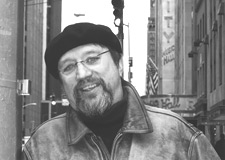
Humanities Professor David Elliott delivered the following address to students at the Student Recogntion Ceremony at Colby-Sawyer College in October 2007
It is 1959. Fidel Castro assumes power in Cuba. The Dalai Lama flees Tibet. Under President Dwight D. Eisenhower, Alaska and Hawaii become the 49th and 50th states. Martin Luther King studies Mahatma Gandhi's doctrine of nonviolent protest. The integrated circuit is born. Frank Lloyd Wright dies. On television, Gunsmoke, Wagon Train and Have Gun Will Travel take the top three slots. The Los Angeles Dodgers win the World Series. Lolita is published.
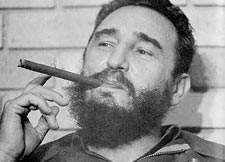
But the boy lying in his bed, thumbing through a comic book, is oblivious to most of these events. He is 12 years old. He lives in the heartland. His Ohio farm town's only claim to fame is Court Street, the first concrete street in the United States. Recently, the town has celebrated its sesquicentennial and the town fathers have Court Street jack- hammered into a thousand pieces.
They sell the pieces as paperweights at fifty cents a hunk. They also hold a beauty pageant. Behold the bespectacled, baton-twirling Miss Concrete Street! Even at the age of 12, the boy thinks this is funny. Many years later, he will read that Ohio is one of two states that still crowns Miss Pork. Downstairs, he hears his parents fighting. Again. “I have to get out of here,” he tells himself.
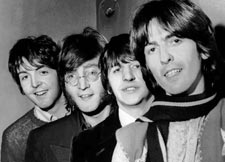
It is 1970. In Kent, Ohio, National Guardsmen gun down four students. They are protesting the U.S. invasion of Cambodia. The Beatles break up. Monday Night Football debuts on ABC.
The boy is now a young man. He is snorkeling in the waters of the Sulu Sea, 9,000 miles from what's left of Court Street and his parents' marriage. Though it will be another five years before Jaws is released, he worries about sharks. As he paddles through the cerulean water, he asks himself two questions: How did I get here? Where am I going?
It is 1975. Saigon falls. All remaining Americans are evacuated. E.L. Doctorow publishes Ragtime. Olivia Newton-John is awarded the Grammy for “I Honestly Love You!”

He is living on the island of Babelthaup in the Western Pacific. He eats taro and fruit bat and lives in a house made of bamboo and nipa thatching. There is no concrete anywhere on the island.
1976 - The U.S. Supreme Court rules that the death penalty is not cruel or unusual punishment. The Song of the Year is, “Send in the Clowns.”
He is in Israel, on a kibbutz near the Golan Heights. “What am I doing here?” he asks himself. “I'm not even Jewish.”
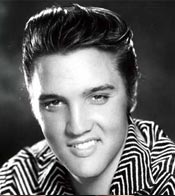
1977 - President Carter grants amnesty to draft evaders of the Vietnam War. Elvis Presley dies. Or does he?
The young man is working in the Cri-Cri Cucumber factory on the island of Crete. Washing cucumbers ten hours a day, he begins to understand what Freud is all about.
1978 - A cardinal from Poland becomes Pope.
With his best friend, the young man is paid to sing Beatles' songs four nights a week in a bar in Cuernavaca, Mexico. The friend stops speaking to him. She becomes a nun. In time, the cardinal from Poland asks her to design and run the Vatican's Web site. Yes! His former best friend becomes the Pope's Web master.
1979 - Nine years after the shooting at Kent state, the families of the four dead students are paid $675,000.
He is living in Libya.
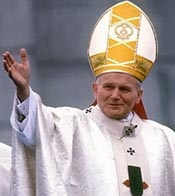
1981 - Pope John Paul is wounded by a gunman. President Ronald Reagan is wounded by a gunman. AIDS is first identified.
He is living in Boston. He is lonely. Confused. At a party, he hears a woman laughing in the next room. Though he hasn't seen the woman, he is drawn to something in the lilt and timbre of her laughter. By the end of party, he is sure he will marry her. Three years later, he does.
1986 - The Challenger explodes.
His son is born.
1998 - U.S. Embassies in two African countries are bombed. All across America nine-year-olds are asking, “But Mommy, who is Monica Lewinsky?”
He and his family move to New Hampshire.
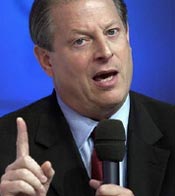
2006 - War. Wiretaps. Torture. Al Gore wins an Academy Award.
He is in a restaurant in New York City. A movie studio purchases the rights to a book he has written – a children's book. Part of him feels giddy, absurd, a bit, perhaps, like Miss Concrete Street. He looks across the table at the producer, the executive producer, the film agent, the book agent. He is swimming in the Sulu Sea.
2007 - War. Wiretaps. Torture. Al Gore wins the Nobel Peace Prize.
He is asked to speak at a celebration of student achievement. He wonders if he should tell them that in his high school graduating class of 1962, he was not in the top ten. Or one hundred. What could I possibly say, he asks himself, to a group of people 40 years younger than I, and on average the same number of pounds thinner?
But he is introduced. He steps to the microphone and says the one thing he is sure is true. “Each of our lives is a story,” he says. “And each of us is the hero of her story and also its author. Your life is a story,” he tells them, “and you are the hero of your story, and also its author.
Like all heroes, you must have courage,” he continues. “But use your courage wisely. Your task is not to save the damsel in distress or to release the prince from his spell. Rather, your work, the work of the hero, is to resist the easy answer, to seek out the truth, to find the way home, just as the author's work is to face the blank page with faith and optimism.”
He reminds them that the principle guiding heroes is not bravado, but compassion, and what makes great writers is not talent, but discipline. Though others may scoff, he tells them not to discount the role of luck in their lives and to trust their intuition. He says that heroes and authors are born of their place and time and that there never was a hero worth his salt, or a writer either for that matter, who was not a citizen of the world.
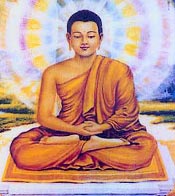
“On your heroic quest, don't be afraid to ask for help,” he advises. “From your friends, from your lovers, from your parents, from your teachers, from your school, from your government, from God, from Yah-weh, from Allah, from Athena, from Ganesh, from Buddah, from the Cosmos. No hero ever accomplished a great task alone,” he says. “And no book is the sole work of its author.”
He tells them to be prepared; the unwritten chapters of their stories are sure to be filled with sudden twists of plot and surprising changes in character development. He reminds them not to take themselves too seriously, for history shows how easily heroes become tyrants, and authors in too much control of their stories write the most disappointing books -- predictable ones.
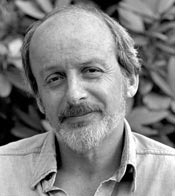
He tells them he has faith in them and encourages them for the tasks ahead by sharing a quote from E. L. Doctorow. “'Writing is like driving a car at night. You can only see as far as the headlights, but you can make the whole trip that way.' The hero's journey is like that, too,” he says.
Finally, he tells them not to worry if they are a hero whose name appears in the newspapers or simply at the top of a to-do list. “The only thing,” he says, “the only important thing is to be good to yourself and to each other. And to do good in the world, for the world, as always, is in need of a little goodness. But,” he adds, “you must already know this. You must already be on the hero's path or you wouldn't be here tonight.”
Now, he is finished. He thanks them for the opportunity of speaking to them, and hopes he wasn't boring or too narcissistic. Oddly, as he prepares to resume his seat, he remembers that he is from Ohio. An image of Miss Pork appears before him. He decides not to have that second helping of dessert.


